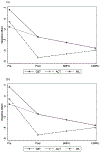Examining Positive and Negative Affect as Outcomes and Moderators of Cognitive-Behavioral Therapy and Acceptance and Commitment Therapy for Social Anxiety Disorder
- PMID: 31735246
- PMCID: PMC6866675
- DOI: 10.1016/j.beth.2019.07.001
Examining Positive and Negative Affect as Outcomes and Moderators of Cognitive-Behavioral Therapy and Acceptance and Commitment Therapy for Social Anxiety Disorder
Erratum in
-
Corrigendum to "Examining Positive and Negative Affect as Outcomes and Moderators of Cognitive Behavioral Therapy and Acceptance and Commitment Therapy for Social Anxiety Disorder" [Behav. Ther. 50(6) (2019) 1112-1124].Behav Ther. 2020 Jan;51(1):203. doi: 10.1016/j.beth.2019.12.001. Epub 2019 Dec 24. Behav Ther. 2020. PMID: 32005337 Free PMC article. No abstract available.
Abstract
Traditional cognitive-behavioral therapy (CBT) for anxiety disorders has been designed to target reductions in negative affect (NA) associated with defense-related processes. However, a subset of anxiety disorders, including social anxiety disorder (SAD), are also characterized by low positive affect (PA) resulting from separate deficits in appetitive-related processes. In contrast to CBT, "third-wave" approaches, such as acceptance and commitment therapy (ACT), align more consistently with motivational processes and, as a result, PA. However, the differential effect of CBT and ACT on PA and NA has yet to be investigated. Using secondary data from a randomized controlled trial, the present study sought to compare CBT's (n = 45) and ACT's (n = 35) effect on PA and NA in SAD. Findings were compared to a wait-list (WL) control condition (n = 31), as well as normative data from a general adult sample. Baseline PA and NA were also examined as moderators and predictors of theory-relevant treatment outcomes. NA decreased significantly in both CBT and ACT from pre to posttreatment. Although ACT outperformed WL in reducing NA, this effect was not observed for CBT. PA increased significantly in both CBT and ACT from pre to posttreatment, with neither ACT nor CBT outperforming WL in increasing PA. Neither PA nor NA were found to moderate theoretically relevant treatment outcomes. Findings suggest that ACT and CBT share common treatment mechanisms, making them more similar than distinct. Further efforts should be focused on optimizing CBT's and ACT's influence on threat and reward learning, and elucidating common processes of change.
Keywords: acceptance and commitment therapy; cognitive-behavioral therapy; negative affect; positive affect; social anxiety.
Copyright © 2019. Published by Elsevier Ltd.
Figures
Similar articles
-
Randomized controlled trial of cognitive behavioral therapy and acceptance and commitment therapy for social phobia: outcomes and moderators.J Consult Clin Psychol. 2014 Dec;82(6):1034-48. doi: 10.1037/a0037212. Epub 2014 Jul 7. J Consult Clin Psychol. 2014. PMID: 24999670 Free PMC article. Clinical Trial.
-
Cognitive mediators of treatment for social anxiety disorder: comparing acceptance and commitment therapy and cognitive-behavioral therapy.Behav Ther. 2014 Sep;45(5):664-77. doi: 10.1016/j.beth.2014.04.006. Epub 2014 May 5. Behav Ther. 2014. PMID: 25022777 Free PMC article. Clinical Trial.
-
The role of the acceptance and commitment therapy in the treatment of social anxiety: An updated scoping review.J Affect Disord. 2022 Aug 1;310:174-182. doi: 10.1016/j.jad.2022.05.008. Epub 2022 May 7. J Affect Disord. 2022. PMID: 35537544
-
Baseline Severity as a Moderator of the Waiting List-Controlled Association of Cognitive Behavioral Therapy With Symptom Change in Social Anxiety Disorder: A Systematic Review and Individual Patient Data Meta-analysis.JAMA Psychiatry. 2023 Aug 1;80(8):822-831. doi: 10.1001/jamapsychiatry.2023.1291. JAMA Psychiatry. 2023. PMID: 37256597 Free PMC article.
-
Physiological and behavioral indices of emotion dysregulation as predictors of outcome from cognitive behavioral therapy and acceptance and commitment therapy for anxiety.J Behav Ther Exp Psychiatry. 2015 Mar;46:35-43. doi: 10.1016/j.jbtep.2014.08.002. Epub 2014 Aug 23. J Behav Ther Exp Psychiatry. 2015. PMID: 25199454
Cited by
-
Recent advances in the understanding and psychological treatment of social anxiety disorder.Fac Rev. 2023 Apr 14;12:8. doi: 10.12703/r/12-8. eCollection 2023. Fac Rev. 2023. PMID: 37077452 Free PMC article. Review.
-
What good are positive emotions for treatment? A replication test of whether trait positive emotionality predicts response to exposure therapy for social anxiety disorder.Behav Res Ther. 2023 Dec;171:104436. doi: 10.1016/j.brat.2023.104436. Epub 2023 Nov 11. Behav Res Ther. 2023. PMID: 37979218 Free PMC article. Clinical Trial.
-
Amplification of Positivity Treatment for Anxiety and Depression: A Randomized Experimental Therapeutics Trial Targeting Social Reward Sensitivity to Enhance Social Connectedness.Biol Psychiatry. 2024 Mar 1;95(5):434-443. doi: 10.1016/j.biopsych.2023.07.024. Epub 2023 Aug 20. Biol Psychiatry. 2024. PMID: 37607657 Free PMC article. Clinical Trial.
-
Pretreatment anhedonia as a predictor of exposure-based anxiety treatment outcomes.J Psychiatr Res. 2025 Jun;186:305-312. doi: 10.1016/j.jpsychires.2025.04.036. Epub 2025 Apr 22. J Psychiatr Res. 2025. PMID: 40279794
-
Changes in Positive and Negative Affect during Acute Psychiatric Treatment in People with Social Anxiety Disorder.Depress Anxiety. 2023 Nov 17;2023:7614830. doi: 10.1155/2023/7614830. eCollection 2023. Depress Anxiety. 2023. PMID: 40224606 Free PMC article.
References
-
- American Psychiatric Association. (2000). Diagnostic and statistical manual of mental disorders (4th ed, text rev) Washington, DC: Author. 10.1176/appi.books.9780890425596 - DOI
-
- Bishop SR, Lau M, Shapiro S, Carlson L, Anderson ND, Carmody J, … Velting D (2004). Mindfulness: A proposed operational definition. Clinical Psychology: Science and Practice, 11(3), 230–241. 10.1093/clipsy.bph077 - DOI



